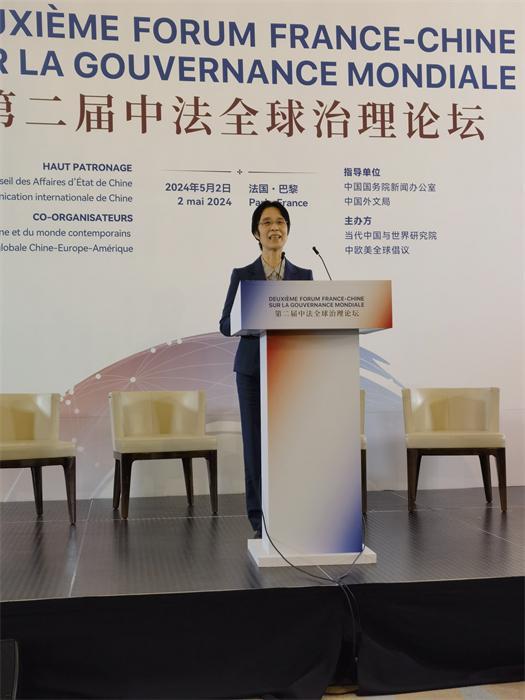Expert calls for enhancing multilateral cooperation in S&T, green development

Jiang Xiaojuan, president of the China Society of Industrial Economics and a professor at the University of Chinese Academy of Social Sciences, speaks at the closing ceremony of the second China-France Forum on Global Governance in Paris, France, on May 2, 2024. [Photo provided to China.org.cn]
Jiang Xiaojuan, president of the China Society of Industrial Economics and a professor at the University of Chinese Academy of Social Sciences, called for greater multilateral cooperation to promote global sci-tech governance, as well as green development at the closing ceremony of the second China-France Forum on Global Governance in Paris, France, on May 2.
Global sci-tech governance
Jiang said the rapid pace of sci-tech advancement makes international cooperation more crucial than ever for scientific innovation, and the widespread application of the internet and digital technologies makes multilateral technological collaboration more convenient.
The continuous dynamic development of technology requires multilateral cooperation across the entire spectrum of innovation, from groundbreaking scientific discoveries to cutting-edge technological advancements, and from large-scale scientific projects to smaller-scale design endeavors, Jiang illustrated.
Large-scale scientific projects related to high-energy physics, deep space exploration, and the origins of life increasingly demand global cooperation, said Jiang.
Jiang pointed out that the global governance of science and technology, especially the governance of artificial intelligence (AI), has become an urgent issue to be addressed through collective efforts of the global community.
The development and governance of AI present both shared opportunities and challenges for the world, and we hope that France, China and other countries can foster global consensus and ensure safe and secure AI development and use to benefit humanity, said Jiang.
Global low-carbon and green development
Jiang said low-carbon and green development is an important issue of global concern. Both China and France attach great importance to this issue and have carried out extensive bilateral cooperation in various areas including technology management, as well as successful experiences in jointly promoting multilateral cooperation.
China has made remarkable achievements in low-carbon and green development, and is willing to make more contributions to global green sustainable development through multilateral cooperation, Jiang noted.
China's new energy industry is developing rapidly and its share of the energy sector has risen significantly. The country's cumulative installed capacity of renewable energy had reached 1.32 billion kilowatts as of the end of 2023. China has held the world's top position for many years in terms of the scale of hydropower, wind power, photovoltaic power, biomass power generation, and under-construction nuclear power. China's new energy vehicle (NEV) sector has also seen fast development in recent years, with 9.6 million NEVs produced in 2023.
China's new energy industry, with its comprehensive advantages in technology, quality and cost, provides new options and opportunities for other countries to accelerate green development, said Jiang, stressing that the rapid growth of the country's NEV industry is attributed to enterprises' diligent efforts, technological innovation and upgrading.
China will continue to deepen cooperation with other countries in the new energy sector, learn from each other's strengths, and achieve common development, Jiang said.
More than 100 Chinese and French experts participated in the forum to discuss the reform on global governance and joint building of multilateralism, which was sponsored by the Academy of Contemporary China and World Studies and China-Europe-America Global Initiative, under the guidance of the State Council Information Office of China and China International Communications Group (CICG).